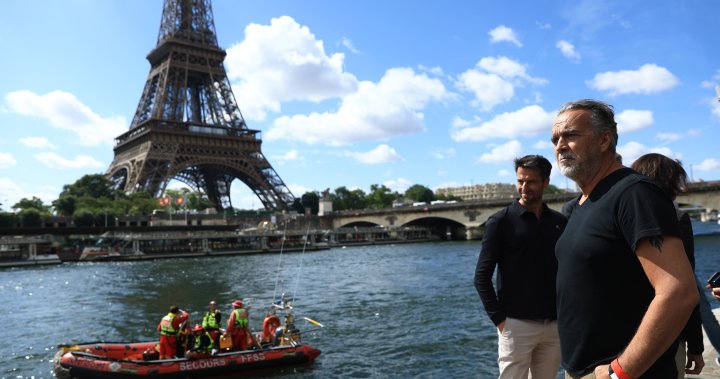Paris’ goal to clean the River Seine in time for the 2024 Olympics has been met with numerous challenges, raising the question of whether the famous waterway will ever pass safety inspections.
The city has spent about 1.4 billion euros in the last decade on a clean-up project to revive the river’s ecosystem and ensure it is safe for use in the 2024 Summer Olympic Games and other swimming events.
But the latest test samples still showed “alarming” bacteria levels in the river, according to a French water charity.
Surfrider Foundation Europe said in its report released last week that all but one of 14 samples taken at the Alexandre III Bridge over six months showed poor water quality.
“It is therefore clear that the athletes who will be taking part in the Olympic and Paralympic events planned for the Seine will be swimming in polluted water and taking significant risks to their health,” the report said.
The findings prompted Paris 2024 Olympics president Tony Estanguet to say that rising E.coli levels from heavy rain remains one of his “biggest challenges” ahead of the games.
Paris plans to open the river to public swimmers by 2025, which hasn’t been allowed for a century because of high pollution levels. Meeting the ambitious goal has meant making some major changes to Paris’ sewage system, primarily by connecting river docks and boats with the system at a cost of $12 million euros. It also includes the construction of a massive rainwater overflow tank called the Austerlitz Basin.
“With just a few weeks to go to the trials, we are becoming increasingly concerned about meeting the deadlines for commissioning the works and bringing them into compliance,” the charity’s report says.
Ted Steiner, professor of medicine at the University of British Columbia, says determining whether it will eventually be safe to swim in the River Seine is “always a numbers game.”
“I would say if the public health authorities locally are comfortable with the measurements that they’ve made, I would trust that calculation,” Steiner told Global News. “There’s never going to be a 100 per cent safe threshold.”
The latest health and medical news
emailed to you every Sunday.
Over the summer, Olympics organizers called off multiple swim tests in the Seine over concerns about the water quality after heavy rain caused overflows of untreated waste into the river.
One of the cancelled tests was a triathlon mixed relay. Estanguet said at the SportAccord conference in Birmingham last week he is confident the event will still take place in the Seine.
“We have contingency plans. We can postpone for rainy conditions. Because it’s programmed at the beginning of the Games we can wait for better conditions. So we are confident that it will be possible to use the Seine,” Estanguet said at a SportAccord conference, as reported by The Guardian.
However, Estanguet also admitted there is no backup location in case heavy rain interferes with water quality in the Seine.
“There is a final decision where we could not swim. It’s what we want to avoid, of course. But there’s a risk, there’s always a risk. When you are in a sport where you rely on the natural conditions, you have to adapt,” he said.

Steiner told Global News that with the right weather conditions, it’s possible Paris could pull off safely hosting swim events in the Seine.
“It’s feasible to clean up a river because the water’s flowing. Things are getting washed through,” he said, referring to bacteria.
“Especially if you’ve got the appropriate volume of water running through the river, things get diluted to a point where there’s not a whole lot of risk.”
Steiner says if there is heavy contamination in the water, ingesting small mouthfuls could potentially be enough to make someone sick. Low levels of contamination shouldn’t pose a high risk to swimmers unless swallowed in large amounts, he says.
“There’s a gradation of risk,” Steiner said.
The River Seine was used for swimming competitions during the last Olympics hosted by Paris more than 100 years ago, in 1900, and for recreation until swimming was banned in 1926 due to pollution concerns.
The analysis of the Seine’s water gave “excellent results” in complying with European regulations in June last year. In the summer of 2022, sites where Olympic swimming events will be held met testing standards at 91 per cent.
What to know about swimming in freshwater
Steiner says the biggest concern regarding bacteria in most rivers, even in Canada, is about exposure to pathogens that may be present in human feces that are more contagious than E.coli, such as shigella and amoeba.
He says E. coli is usually used as “a marker for fecal contamination.”
“It’s not necessarily the E.coli itself. That’s the danger,” he said.
Swimmers can come into contact with more severe E.coli strains such as the shiga toxin-producing E.coli linked to the Calgary daycare outbreak last year, Steiner says, but others are more present in freshwater such as protozoan parasites, cryptosporidium and giardia.
Steiner says there’s not much you can do if you’ve accidentally swallowed water, but if you start to experience gastrointestinal symptoms such as vomiting and diarrhea, consider seeing a practitioner.
“The good news is that these diarrheal infections are self-limited in the vast majority of people,” he says.
Steiner says immunocompromised individuals are at the highest risk of getting sick after consuming contaminated water, but he says he wouldn’t tell anyone not to swim in rivers or lakes if they want to.
“I just think you should be cautious and obviously keep an eye out for warnings or water advisories. But I think the biggest risk to swimming in fresh water is still drowning… than from ingestion of anything dangerous in water,” he said.
© 2024 Global News, a division of Corus Entertainment Inc.



